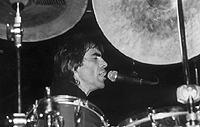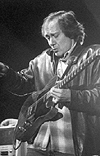
Jim Weider and Randy Ciarlante
by John Feins
This article first appeared in the National Academy of Songwriters' Musepaper, Volume 2, Issue 1, January 1999, as a sidebar to the cover story about Rick Danko and The Band.The Songwriters Musepaper is the official publication of the National Academy of Songwriters (NAS), a tax-exempt, 501(c)3 educational organization whose mission is to educate songwriters and advance the craft of songwriting.
Copyright © 1999 John Feins, National Academy of Songwriters. Reprinted with permission.
Band Photos by George Lambesis.
Jim is a master of the Telecaster and blues and slide guitar. He was born and raised in the musical community of Woodstock during its musical Mecca peak, broadened his talents and established himself in Nashville in the early
 |
"Spirit of The Dance..."
Randy: Jimmy had an idea... had that title. He wanted to write a sort of dance kind of song that had that Bo Diddley kind of rhythm groove. Levon always wanted to put sort of a jungle beat groove on this record. We hadn't recorded one like that up to that point. I think we had seven or eight or nine songs recorded. It was Jimmy's idea with the dance and we sort of were banging it around and working it at Jim's studio and we developed the theory of trying to bring it back to the roots of dance and we tried to write the lyrics in that vein. Pretty much developed a lot of it here at Jimmy's studio. Jimmy had a lot of really good chord changes through it.
Jim: Actually the tune was orginally was called "Dance." And the chorus went "dance ╬til the night turns to day." We had a different chorus and all the music was written and then Randy came back with all these really great lyrics, cause we just had a chorus and some idea that we wanted to make it something about the celebration of the dance, you know, tie die... all those tie die hippie girls out there in the fields. So Randy came back with this great idea and all these really good lyrics and then me and him got together and finished up another verse and the we brought it in to the guys, right Ran?
Randy: Yeah we brough it into the guys and we sorted of wanted Rick to take it over because Rick hadn't really had a stylistic song like that on the record and we thought that his cadence and his singing ability really works good on this piece. And what he did... he came in and made that piece. He immediately attacked the chorus of the tune and sort of developed it to where he would feel comfortable. He changed some of the lyrics around to where he could actually tell the story and feel good about it. The person that's singing the piece really has to identify with the story and Rick identified a lot with what we had written. He just wanted to turn the cadence of the chorus around, he changed some of the lyrics and then he... he's one of the greatest singers in Rock and Roll and he just put great harmonies on it, and tremendous melodies.
Jim: He changed the melody actually, on the chorus. Ours was "Dance ╬til the night turns to day" and he changed it to "Dance, dance, dance the night away." He changed the actual phrasing and the melody and he was much happier with that and we liked it, so it really turned the song into a whole different feel. Then Levon came in and he changed a couple of the lyrics, that "silvery stars" and a few of the lines.
Randy: Lee's good at that, he'll come in and he'll fix a few... if a verse isn't reading just right or a spot in the chorus isn't reading just right, he's a great storyteller, so he'll just turn a few words around here and there and boom, before you know it your sentences are really making a lot of sense your story's making a lot of sense and the guys that are singing it, in The Band style, all of the sudden, man, it's home for them. It made sense for them and I think that's what made Jimmy and myself really happy because that's the name of the game, trying to get the guys to feel comfortable with a piece of music that you're trying to write. You know, you're sort of writing it for them...
 |
The Band songs seem to come right out of the fabric of personal life. There is not a lot of playing around or imaginitive kind of songwriting.
Randy: "White Cadillac" goes into that. If you look at that, it comes from all the stories we heard on the bus, about Levon, back of the bus stories from million year rides with Dunkin' Donuts, hearing about Ronnie Hawkins. Those come directly from that.
And that is apparently how it used to be too...
Jim: I think Robbie Robertson got a lot of ideas from Levon Helm's storytelling about down south, just the whole mystique of the south, for a northerner.
Randy: You know we get lot of songs that come in. They send in tons and tons of cassettes and cds to these fellas. One thing Garth Hudson has always stated, on our rides, is that if you don't really know the characters that you're involved with, you really can't write for them. So, I think we, by being around them for so many years, we sort of know the intracacies of how they think and what they want to hear and how they want to present the stuff. We really zeroed in on their personalities for these two pieces of music, specifically for them to play the song and for them to sing the song. I know I did and I know Jimmy probably did too, right down to the music that got written for it, how the fellas like to play. I mean we had originally written "Spirit of The Dance" as a Latin piece. We had to hone it down from that to make it comfortable for a Band record.
Seems that there's more songwriting from The Band on this record.
Randy: For some reason High on The Hog ended up being the way it was. But if you go into Levon's vault, we cut some tracks that we originally wrote collectively, a bunch of them, that are still sitting on the shelf and for one reason or another didn't get recorded. We've been trying to write songs for a quite a few years and for some reason this particular album was the first one... maybe we felt we had matured enough to do it. I definitely think in the future it's gonna be a lot more of this going on, where The Band's just gonna write maybe even 85% or 90% of the next record. Everybody's starting to feel really confident. I think Rick will tell you that if you talk to him. He's starting to feel very confident in working with us as songwriters and he feels confident in his own songwriting. He's really prolific man, you know, it just takes a long time to do it, you gotta sit in that room. You gotta sit in that pink house.
Do you have the sense of being able to be patient about the songs as opposed to the pressure to record and put out albums?
Randy: Absolutely. Jimmy and I work on songs all the time, for months on end. Sometimes things come really fast. But, we'll cut ╬em a bunch of times and we'll rework the lyric, we'll rework the chord changes. Jimmy does 99% of the chord changes and stuff like that. I'll write stuff at home and bring it in to him just so he can modify it, he can make it really make some sense. He's really good at lyrics and choruses. We really work really hard at it.
A lot of rewriting...
Randy: A lot of rewriting, yeah. Some people can just wake up and they got a song in their head. But for me it's a lot of work.
Jim: A lot of work... A lot of work.
John Feins is the Director of Programs for NAS.